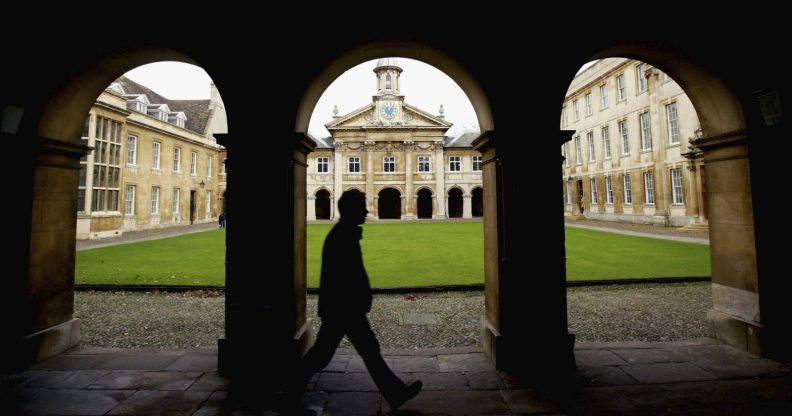Cambridge university declares free speech more important than basic respect for ‘diverse identities’

Cambridge University (Graeme Robertson/Getty Images)
The University of Cambridge has voted against a proposal requiring staff and students to be “respectful” of differing views and “diverse identities”.
A total of 86.9 per cent of the governing body objected to the proposal, opting instead for academic freedom and a policy that emphasises “tolerance” of differing views rather than respect.
The motion essentially prevents “no-platforming”, opening the door for Cambridge university to host “gender critical” feminists and other controversial speakers – an issue that has led to protests in other universities.
“Freedom of speech is a right that sits at the heart of the university. This statement is a robust defence of that right,” insisted Cambridge’s vice-chancellor, Stephen Toope.
“The university will always be a place where anyone can express new ideas and controversial or unpopular opinions, and where those views can be robustly challenged. The statement also makes it clear that it is unacceptable to censor, or disinvite, speakers whose views are lawful but may be seen as controversial.
“Rigorous debate is fundamental to the pursuit of academic excellence and the University of Cambridge will always be a place where freedom of speech is not only protected, but strongly encouraged.”
The new policy reads: “In exercising their right to freedom of expression, the university expects its staff, students and visitors to be tolerant of the differing opinions of others, in line with the university’s core value of freedom of expression.”
It adds that staff, students and visitors should be “tolerant” of the diverse identities of others, in line with the university’s “core value of freedom from discrimination.”
While the changes to the original policy statement were welcomed by an overwhelming majority of the governing body, they were met with concern by several university academics.
According to writer and academic Priyamvada Gopal, “this was always about transphobia and related nastiness (violating university policy) being given a platform”, and not at all about free speech.
Tweeting at length on the matter, Gopal dismissed the vote as “a government-ordered regulation suppressing protest (under the guise of free speech) [that] has been pushed through with enthusiasm by a large number of traditionalist (mostly) men.”
“There is no ‘free speech row’ at Cambridge,” she explained. “There is the university scrambling to follow government orders based on false moral panic, there are the poor students trying to make it less draconian, and there are the Freeze Peach brigade trying to stop the right to protest.”

